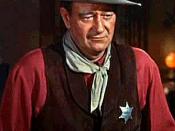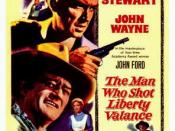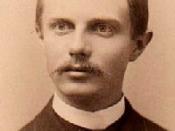The American West
Picture it... John Wayne in a film of cowboys and Indians. Easy, right? Now picture a different scenario... John Wayne playing a ruthless entrepreneur who works with Indians to make money any way he can. The second scenario would be a bit of a stretch from the truth, especially considering John Wayne. But what is this truth that we are comparing John Wayne to? Is it real? And why are we so bound to believe the first situation instead of the second? It is a myth... the myth of the American West that has been stamped into the minds of all who have come after the beginnings of the frontier.
People such as John Ford, along with other directors and/or writers, have taken the idea of the American West and the frontier and distorted it. For the purpose of entertainment, they have added somewhat fictional details to a true story.
The result is a blurry legend for Americans to behold and make their own. Yet, the directors and writers are not responsible for this myth; it is the Americans who choose to see entertainment as their source of history.
On the other hand, Frederick Turner's essay, "The Significance of the Frontier in American History," does a good job of painting an accurate picture in our minds. He does not exploit the "entertainment" aspect of what the American frontier has to offer. However, he discusses the practicality of frontiersmen moving west. One quote in particular, in my point of view, correlates quiet well to the following movies and reading: High Noon, Stagecoach, The Man Who Shot Liberty Valance, and "The Man Who Shot Liberty Valance". Turner says, "This perennial rebirth, this fluidity of American life, this expansion westward with its new opportunities, its...


